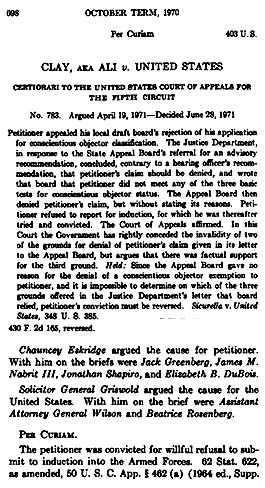
 U.S. Supreme Court. CLAY, aka ALI v. UNITED STATES. Washington, D.C.: GPO, 1971.
U.S. Supreme Court. CLAY, aka ALI v. UNITED STATES. Washington, D.C.: GPO, 1971.
SuDoc No.: JU6.8:403
Case No.: 403US698
Date Argued: April 19, 1971
Date Decided: June 28, 1971
 View full text
View full text
Muhammad Ali (formerly Cassius Clay) was drafted into the army in 1967
but refused induction, filing a petition to obtain conscientious objector
status as a member of the Nation of Islam. His original request was denied
and on appeal the Justice Department intervened, writing Muhammad Ali's
draft board requesting that his appeal be denied. The appeal board relied
on the Justice Department letter so heavily, that it gave no justification
for the denial. As a result, Ali was granted conscientious objector status,
winning his case in the highest court in the land in a unanimous decision.
The Supreme Court noted the three criteria for an individual to obtain
conscientious objector status. First, the individual must be opposed to
war in any form (not just a particular war). Second, the individual
must show that "this opposition is based upon religious training and
belief, as the term has been construed in our decisions." Third, the
individual must show that the objection to war is "sincere." The letter
from the Justice Department argued that Ali failed on all counts.
Before the Supreme Court however, the United States government conceded
that Muhammad Ali's decision was based upon the "religious training and
belief" of the Nation of Islam after all, and that his reasons for doing
so were indeed sincere. However, they argued that Muhammad Ali was not
against all war but only wars that were not declared by Allah, which in
fact he had personally stated many times. But because the Justice
Department "was simply wrong as a matter of law in advising that the
petitioner's beliefs were not religiously based and were not sincerely
held" and because the appeal board did not state which of the three
criteria Muhammad Ali had not met, the Supreme Court Justices decided
(9-0) in favor of Muhammad Ali.

|
|
|

